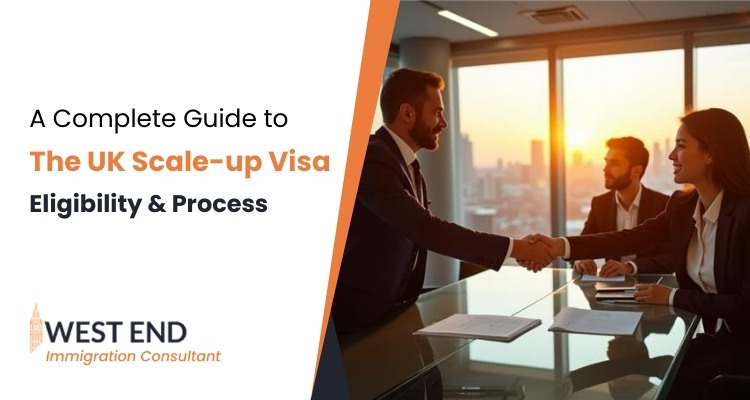
How to Sponsor a Charity Worker Visa?
February 17, 2025
International Recruitment Changes: A Comprehensive Guide
March 14, 2025The UK has around 34,180 scale-up businesses, but only 67 companies have a licence to sponsor overseas workers through the scale-up visa UK route. (Source: Free Movement) Q3 of 2024 saw just five applications under this visa category.
The UK government launched the Scale-up visa in 2022 to help to grow businesses attract skilled professionals faster from around the world. This visa gives distinct advantages to businesses and skilled workers.
This complete guide will explain everything you need to know about the Scale-up visa. You'll learn about eligibility requirements, application processes, sponsorship details and settlement options.
What is the UK Scale-up Visa?
The Scale-up Worker visa, launched in August 2022, creates a pathway for talented professionals to work in the UK's ever-changing companies. The visa requires sponsorship from an approved UK scale-up business for at least six months. After this period, visa holders gain remarkable flexibility in their employment choices.
Scale-up businesses must show substantial growth to qualify as sponsors. Companies need to demonstrate a 20% average annual increase in either employment or total sales over three consecutive years, with at least 10 employees at the start. Only 67 companies from the pool of eligible businesses currently hold a sponsorship licence.
You can stay in the UK for two years with this visa and extend it for three more years. The visa features a hybrid approach to employment requirements. Workers must stay with their sponsoring employer for the first six months. After that, they can:
- Work in any role without sponsorship
- Take on additional employment
- Pursue self-employed opportunities
- Participate in voluntary work
- Study (subject to Academic Technology Approval Scheme requirements)
The salary structure ensures fair compensation. Sponsored workers must earn at least £36,300 yearly, though this amount varies based on when the Certificate of Sponsorship was assigned. The role must also meet the going rate for the specific occupation code.
During the first six months, any major changes to employment, such as switching employers or roles, usually require a new Certificate of Sponsorship and visa application. The visa has certain restrictions - holders cannot access public funds or work as professional sportspersons.
Settlement prospects make this visa particularly attractive. Visa holders become eligible for indefinite leave to remain after living in the UK continuously for five years. They must not spend more than 180 days outside the UK in any consecutive year to maintain their settlement eligibility.
Your family members can benefit from this visa route too. Dependent partners over 18 and children under 18 can join you in the UK. This makes the Scale-up visa an excellent choice for professionals planning to relocate with their families.
The visa combines sponsored employment with future flexibility to create a balanced pathway. This approach serves both growing businesses and skilled professionals well. The route shows promise for those looking to contribute to the UK's high-growth business sector, even though current uptake remains modest with only five applications in Q3 of 2024.
Why Choose the Scale-up Visa?
The Scale-up visa gives skilled professionals a unique path to advance their careers with the UK's fastest-growing companies. This new visa category brings several advantages that make it stand out from other options.
1. Faster Route to UK Work and Settlement
The Scale-up visa creates a direct path to permanent UK residency. Visa holders can apply for indefinite leave to remain after living in the UK for five years. You can pursue this settlement option whether you stay with your first employer or switch to new opportunities.
Your qualifying family members can join you through dependent visas that also lead to settlement. This makes the Scale-up visa perfect if you plan to relocate with your family for the long term.
2. Flexibility to Switch Jobs after Six Months
This visa's unmatched job flexibility makes it truly special. After your first six months with the sponsoring employer, you get remarkable freedom to shape your career. You can:
- Switch employers without new sponsorship
- Take different roles in your field
- Start your own business
- Work for companies that don't have sponsor licences
This freedom becomes even more valuable since most UK companies don't hold sponsor licences. Scale-up visa holders can explore many more job opportunities compared to other visa types.
3. High-Growth Opportunities for Professionals
The Scale-up visa connects talented people with the UK's most successful growing businesses. These companies must show strong growth of 20% or more in either jobs or revenue year-over-year for three straight years.
You'll work in dynamic settings with other high achievers. About half of scale-up businesses hire staff from the EU (47%), and 36% bring in talent from outside the EU. These companies value international expertise - 21% have international staff making up a quarter or more of their workforce.
This visa costs less than other options, with lower application fees than the Skilled Worker visa. Sponsors don't pay the Immigration Skills Charge, which saves up to £1,000 yearly. These economical solutions and optimised processing make it an attractive choice for employers and skilled professionals alike.
UK Scale-up Visa Eligibility Criteria
Getting a Scale-up Worker visa means meeting several requirements set by UK Visas and Immigration. A full picture of these requirements will help you get your application approved.
1. Employer Sponsorship Requirement
You need to get a valid Certificate of Sponsorship from an approved UK scale-up business. Your sponsoring company must show strong growth with a 20% increase in employment or total sales over three years. The company should be at least 10 employees strong.
2. Skill Level and Salary Threshold
Your role must be at graduate level or above and listed in Table 2 or Table 3 of Appendix Skilled Occupations. The pay must be higher of these two:
- £36,300 per year
- The 'going rate' for your specific occupation code
To cite an instance, if your job's annual going rate is £37,000 but the offered salary is £36,400, your application won't succeed because it's nowhere near the occupation's standard rate.
3. English Language Proficiency
You must show your English language skills at CEFR Level B1 or higher in reading, writing, speaking, and listening. You can prove this by:
- Taking a Secure English Language Test (SELT)
- Having a GCSE, A-level, or Scottish qualification in English from UK study before age 18
- Completing a degree taught in English
- Being from certain English-speaking countries like Australia, Canada, New Zealand, and the USA
4. Financial Requirements (If Applicable)
You need £1,270 in savings and must manage to keep this amount for 28 straight days before applying. However, you don't need this if you:
- Have lived in the UK with a valid visa for 12 straight months
- Get certification from your UK sponsor about accommodation and maintenance support through your first month of work
Your employer has extra duties, which include making sure your position follows UK's minimum wage and working hours rules. Breaking these rules could get your application rejected.
Scale-up Visa UK Application Process
Getting a Scale-up Worker visa requires several significant steps in a specific order. A clear understanding of each stage will make your application process smoother.
1. Check Eligibility
You and your future employer need to meet all requirements. Your employer should be an approved scale-up sponsor. The job offer must be for a role listed in Table 2 or Table 3 of Appendix Skilled Occupations.
2. Get a Job Offer
After confirming eligibility, you'll need a job offer from an approved scale-up business. Your employer will give you a Certificate of Sponsorship (CoS). This document has all the important details about your role and confirms it meets visa requirements.
3. Prepare Documents
Here's what you need to gather:
- Valid passport or travel document
- Certificate of Sponsorship from your employer
- English language qualification certificates
- Financial statements showing £1,270 in savings (unless your employer covers maintenance)
- Tuberculosis test results (if applicable)
4. Apply Online
The UK government's official website is where you'll submit your application. You'll pay an £822 application fee plus the Immigration Health Surcharge of £1,035 per year. The system lets you save your progress and finish the application later.
5. Attend a Biometric Appointment
After submitting your online application, you must verify your identity. Your nationality and passport type will determine if you:
- Use the 'UK Immigration: ID Check' app to scan your identity document
- Visit a visa application centre to provide fingerprints and photographs
Note that for visa application centre appointments:
- The centre might keep your passport during processing
- You may need to travel to another country to find your nearest centre
- Core service point appointments cost nothing, but enhanced service points charge extra fees
6. Wait for a Decision
Standard processing takes:
- Applications outside the UK: 3 weeks
- Applications inside the UK: 8 weeks
Your application might take extra time if:
- Your supporting documents need verification
- You need an interview
- Your personal circumstances require more review (e.g., criminal convictions)
- Visa systems face technical issues
Faster decisions are possible with priority services:
- Super priority service: Decision within 2 working days
- Priority service: Decision within 5 working days
UK Scale-up Visa Sponsorship
The Scale-up visa route offers a different approach to sponsorship. Employers need to keep sponsorship responsibilities only during the first six months of employment. This quickest way helps businesses hire international talent and reduces paperwork.
Businesses must show impressive growth numbers to become Scale-up sponsors. The standard path requires 20% yearly growth over three years. Companies can measure this through staff numbers or revenue, and they must have at least 10 employees when they start.
Employers must give approved workers a Certificate of Sponsorship (CoS). This vital document lists the job offer details, salary, and role requirements. The position must follow both National Minimum Wage Regulations 2015 and Working Time Regulations 1998.
Sponsorship comes with specific duties. Employers must:
- Maintain accurate records for each sponsored worker
- Report significant changes in employment status
- Monitor worker attendance and role changes
- Ensure compliance with salary requirements
- Commit to employing the worker for at least six months
After the original six-month period, sponsorship duties end. Workers get more flexibility and employers have fewer administrative tasks. Businesses should create retention strategies because they invest time and money in recruitment and sponsorship.
The Home Office labels the Scale-up route as a 'Temporary Worker' route. Standard Temporary Worker fees apply to licence applications and CoS assignments. Large businesses pay £1,476 and small businesses pay £536 to apply for a Scale-up licence. Each Certificate of Sponsorship costs £25.
Scale-up sponsorship has a unique benefit - no Immigration Skills Charge applies. This saves sponsors up to £1,000 in the first year. The affordable approach appeals to growing businesses that want international talent.
Knowing how to meet compliance requirements is significant for businesses thinking about Scale-up sponsorship. The Home Office checks:
- Company history and stability
- Previous compliance record
- HR systems effectiveness
- Ability to provide secure employment
- Capacity to monitor employee progress
The Scale-up sponsorship model balances what employers need with worker flexibility. It provides a practical solution for businesses with steady growth. Companies can build a stronger workforce and handle administrative duties well through careful planning of sponsorship responsibilities.
What Happens After Getting a Scale-up Visa?
Scale-up Worker visa holders begin a well-laid-out pathway that combines original stability with remarkable career flexibility. This visa allows a two-year initial stay and provides a unique mix of sponsored and unsponsored periods that makes it different from regular work visas.
Visa holders must stay with their sponsoring company during the first six months. A new visa application becomes mandatory when changing employers during this time. However, switching roles within the same organisation doesn't need extra paperwork.
Scale-up visa holders gain significant career freedom after their first six months. They can:
- Stay with their current employer
- Move to different companies without sponsorship
- Start self-employed ventures
- Take on voluntary work
- Study (subject to ATAS requirements)
The visa's extension process showcases this flexibility. Professionals can extend their stay by three years when their visa expires. These extensions don't need a new sponsor. Applicants must prove they have:
- Worked in their sponsored role for at least six months
- Net earnings requirements during half of their previous visa period
Extension decisions usually come within eight weeks. The timeline might increase when:
- Supporting documents need verification
- An interview becomes necessary
- Personal circumstances need extra review
Scale-up visa holders can see a clear path to permanent residency. They become eligible for indefinite leave to remain after five years of continuous residence. This settlement path requires consistent employment with yearly earnings of at least £36,300. Applicants must also show PAYE earnings at this level for at least 24 months within three years before their settlement application.
Family members play a key role in this visa category. The main applicant's visa extension doesn't automatically cover dependant family members. However, family members can apply at the same time or before their current visas expire. This setup will give families confidence to plan their long-term UK future.
Conclusion
Scale-up visas stand out as a unique path for skilled professionals who want to work in the UK's most dynamic companies. After six months, visa holders can explore different career opportunities without needing sponsorship. This flexibility makes the visa particularly attractive.
The application steps are clear when you prepare well. Your success depends on a few key elements: you require sponsorship from an approved scale-up business, the right skill set, good English language skills, and proper financial backing.
Do you require help with your Scale-up Visa? Westend Consultants is here to support you. Our team helps employers get sponsorship approval and guides applicants through the immigration process.
Reach out today, and we'll help make your UK immigration process smoother.


